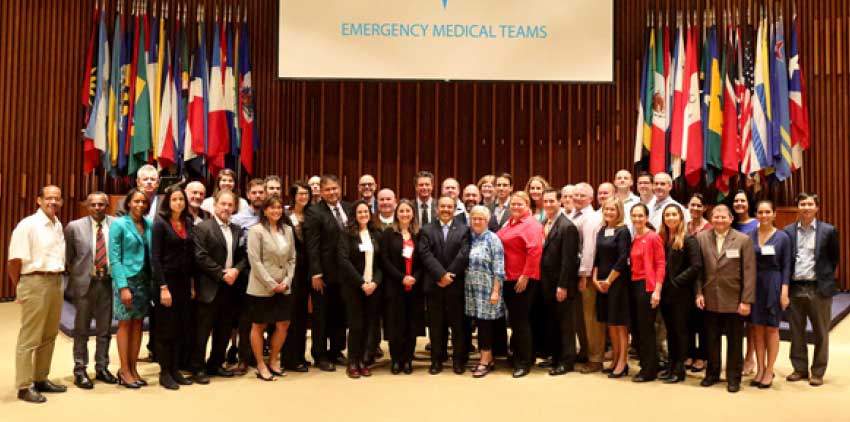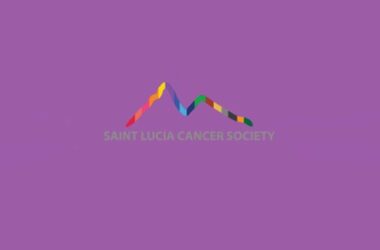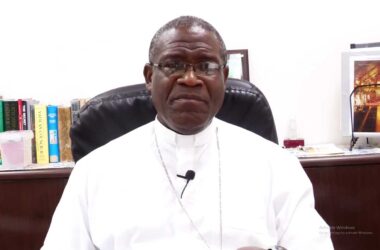PRESS RELEASE – AS a result of the efforts of the President of the Caribbean College of Surgeons, Dr. Ramesh Jonnalagadda, a team was invited to represent the College at the Emergency Medical Teams Mentoring Workshop for NGOs which was held in Washington recently.

The College was represented by Dr.Jonnalagadda and Dr. Charles Greenidge.
The objectives of the workshop were:
1. To prepare NGOs for verification as EMT’s
2. To strengthen NGOs capacity to respond to emergencies
3. To advance the EMT initiative globally
During the workshop, participants were exposed to the need to have EMTs so that disasters can be mitigated by a quick and organised response. Participants were taken through the various requirements for an EMT.
There are different types of EMT:
• EMT 1: This is what we would consider an aid station where people come and have minor injuries attended to. EMT 1’s may be fixed or mobile.
• EMT 1 mobile: This is where workers go daily into the field from a base and the next form is EMT 1 fixed where the patients are brought to the base.
• EMT 2’s and 3’s: Are equivalent to a mobile hospital where surgeries and overnight stay is possible.
• Specialist team/cell: For example, a surgical specialist cell can be set up to provide only surgeons and this team would attach itself to an EMT who requires that cell. In this case, the EMT would provide all necessary support. Specialist cells can have increasing sophistication where in addition to surgeons they also provide anaesthetists, nurses, technicians, equipment etc.
During the workshop, it became clear that the CCOS could participate in the process in two ways: to encourage the formation of EMTs in the Caribbean in general, but specifically to form a specialist surgical cell.
EMTs must be completely self-sufficient with personnel and equipment that can be set up anywhere in the world at a moment’s notice. EMTs must generally be able to house and feed themselves and provide all facilities such as electricity, water and waste disposal. This, as you can imagine, requires a lot of material and logistics. We learned from a Costa Rican team which was recently verified that the approximate start up cost was US$700,000.
Training was conducted by Dr. Ian Norton, who has the responsibility for EMTs globally and Dr. Luis de La Fuente, who has responsibility for the Americas, and he is the one who will be giving us further training later this year. We also heard from members of the Australian Medical Assistance Team (AUSMAT), namely Bronte Martin and Terry Trewin. The North Australians have extensive practical experience in the setting up and running of EMTs. They were very helpful in helping us understand the importance of many of the components of the EMT.
We were able to network with other NGO medical teams which are already quite experienced, such as the International Medical Corps and a surgical specialist cell from the Massachusetts General Hospital. They appreciated in this world of increasing super specialisation the value that the CCOS surgeons would bring as ‘true’ general surgeons.
In order to avoid problems of inappropriate activity by some teams in the past, the system is moving to verification where for a team to be able to assist it will have to be verified by WHO. Verification must be our goal. The CCOS has communicated its desire to the regional CMOs and CEDEMA to assist in disaster situations throughout the Caribbean and we have received positive responses from them.
It is important for countries to have an EMT in place to handle the effects of major disaster, such as the aftermath of Hurricane Thomas and the Christmas Eve trough. A well-equipped, trained team will be able to respond rapidly and reduce the effects of disaster on its citizenry. These teams are fully mobile and can serve locally, regionally and internationally. Their formation requires the selection of team members consisting of doctors, nurses, contractors, electricians, plumbers and logistical personnel, to name a few. They need medical equipment and to be able for their own feeding, water, waste disposal and housing. The team needs to be trained and well-rehearsed.
At this stage we have been exposed to the EMT concept and the requirements involved in forming one and expect to receive further training later this year so that we may continue to build our capacity.



![Simón Bolívar - Liberator of the Americas [Photo credit: Venezuelan Embassy]](https://thevoiceslu.com/wp-content/uploads/2025/12/Simon-Bolivar-feat-2-380x250.jpg)






